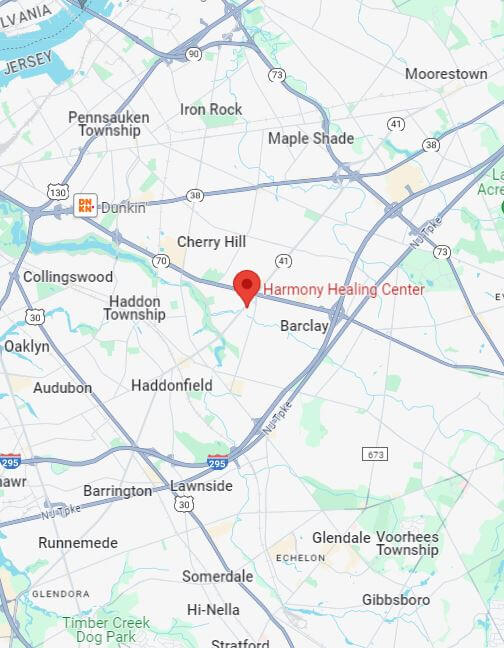Anxiety is a natural human emotion, a protective response to stress or danger. However, for millions of individuals in Cherry Hill, New Jersey, and across the greater South Jersey region, anxiety can become a pervasive force, transforming from a helpful signal into a debilitating wall that restricts daily life. When worry becomes constant, overwhelming, and interferes with your ability to function, it may be an anxiety disorder – a treatable mental health condition.
At Harmony Healing Center in Cherry Hill, we understand the profound impact anxiety can have on your life. We are dedicated to providing compassionate, evidence-based anxiety treatment that empowers you to dismantle that wall of worry, develop effective coping strategies, and reclaim a life of peace and balance. Our mission is to offer a safe, supportive, and accredited environment where healing is not just possible, but a reality for every member of our community.
Free Confidential Assessment Call:
Understanding Anxiety Disorders
Anxiety disorders are more than just occasional worry or stress; they are a group of mental health conditions characterized by intense, excessive, and persistent worry and fear about everyday situations. These feelings are often disproportionate to the actual threat and can lead to significant distress and impairment.
What Defines an Anxiety Disorder (Beyond Typical Stress or Worry)
It’s normal to experience stress or worry in response to life’s challenges. However, clinical anxiety disorders are distinguished by their persistence, intensity, and the significant interference they cause in daily life. Unlike typical stress, anxiety disorders involve:
- Excessive and uncontrollable worry: The worry is constant and difficult to manage, even when there’s no clear reason for it.
- Physical symptoms: Anxiety manifests physically, often with a racing heart, shortness of breath, muscle tension, or digestive issues.
- Avoidance: Individuals often begin to avoid situations, places, or people that trigger their anxiety, leading to social isolation and functional impairment.
- Disproportionate reaction: The level of fear or worry is out of proportion to the actual threat.
The Most Common Types We Treat
Harmony Healing Center offers comprehensive treatment for a wide spectrum of anxiety disorders, tailoring our approach to your specific needs:
- Generalized Anxiety Disorder (GAD): Characterized by persistent, excessive worry across many areas of life, such as health, work, finances, or family, often without specific triggers.
- Panic Disorder: Involves recurrent, unexpected panic attacks—sudden, intense episodes of fear or discomfort accompanied by severe physical symptoms like heart palpitations, sweating, trembling, and a feeling of losing control or impending doom.
- Social Anxiety Disorder: An overwhelming fear of social judgment or embarrassment, leading to intense anxiety in social situations and often avoidance of public interactions.
- Specific Phobias: Intense, irrational fears of particular objects or situations (e.g., heights, flying, certain animals, needles), leading to significant avoidance.
- Obsessive-Compulsive Disorder (OCD): While distinct, OCD often overlaps with anxiety, involving intrusive thoughts (obsessions) and repetitive behaviors (compulsions) performed to reduce anxiety. We offer specialized therapies for this intersection.
The Toll Anxiety Takes on Day-to-Day Functioning, Relationships, and Physical Health
Unmanaged anxiety can severely impact various aspects of your life:
- Day-to-day functioning: Difficulty concentrating at work or school, problems with decision-making, and an inability to perform routine tasks.
- Relationships: Leading to social withdrawal, irritability, communication breakdowns, and strain with family and friends.
- Physical health: Chronic anxiety can contribute to sleep disturbances, digestive problems, weakened immune function, and exacerbate existing medical conditions due to the constant activation of the body’s stress response.
The Prevalence of Anxiety in New Jersey
Anxiety disorders are a significant public health concern throughout New Jersey, impacting individuals across all demographics and highlighting the urgent need for accessible treatment.
According to the New Jersey Department of Health (NJDOH), anxiety is the most common mental health condition among both adults and adolescents in the state. This widespread prevalence underscores how many individuals are silently struggling.
In Camden County, where Cherry Hill is located, there has been a notable rise in emergency room visits for anxiety and stress-related issues, particularly in the aftermath of the pandemic. This often indicates a lack of accessible outpatient support, leading individuals to seek crisis care when their symptoms become overwhelming.
The impact on youth is particularly concerning: nearly 40% of New Jersey high school students report persistent feelings of sadness or hopelessness, and anxiety rates are steadily rising among students, affecting their academic performance and social development. Additionally, veterans and first responders in local populations often experience higher rates of PTSD and generalized anxiety due to their unique experiences and exposure to trauma.
Despite New Jersey’s relatively good insurance coverage, local barriers to treatment persist, including the pervasive stigma surrounding mental illness, long waitlists for specialized care, and a lack of specialized providers in South Jersey. Harmony Healing Center is dedicated to addressing these critical needs, providing essential mental health support and anxiety treatment right here in your community.
Signs and Symptoms of Anxiety
Recognizing the signs of anxiety is the first step toward seeking effective help. Anxiety disorders can manifest through a wide range of symptoms, affecting your thoughts, emotions, and behaviors.
Emotional and Cognitive Symptoms
Individuals often experience racing thoughts, where their mind feels overwhelmed with worries, fears, or scenarios. This is frequently accompanied by excessive worry, a pervasive and often uncontrollable feeling of apprehension about future events or everyday situations. A persistent sense of dread or impending doom can also be present, even without a clear threat. Other emotional and cognitive signs include difficulty concentrating, irritability, a feeling of being constantly “on edge,” and catastrophic thinking.


Physical Symptoms
The physical manifestations of anxiety can be distressing and sometimes mimic other medical conditions. These include chest tightness or discomfort, insomnia or other sleep disturbances due to racing thoughts or physical tension, and stomach issues such as nausea, indigestion, or irritable bowel syndrome (IBS). Many also experience a rapid heartbeat or palpitations, shortness of breath, sweating, trembling or shaking, muscle tension, headaches, and dizziness or lightheadedness. These physical symptoms can be particularly alarming during a panic attack.
We are available 24/7 to answer your calls and address online inquiries.
Behavioral Symptoms
Anxiety can significantly alter behavior, often leading to patterns that further perpetuate the cycle of fear. A common impact is avoidance, where individuals steer clear of situations, places, or activities that trigger their anxiety, which can severely limit their life. Reassurance-seeking is another frequent behavior, where individuals constantly ask others for validation or confirmation to alleviate their worries. Withdrawal from social interactions, hobbies, or responsibilities is also common. In some cases, individuals may turn to substance use as a coping mechanism to self-medicate their anxiety, creating a co-occurring disorder.

Causes and Risk Factors
Anxiety disorders are complex, typically arising from a combination of biological, psychological, and environmental factors. Understanding these contributing elements is key to developing effective anxiety treatment strategies.
Genetic Predisposition and Brain Chemistry
There is a significant genetic predisposition to anxiety disorders, meaning they often run in families. If a close relative has an anxiety disorder, you may be at higher risk. Research also points to imbalances in brain chemistry, particularly involving neurotransmitters like serotonin, norepinephrine, and GABA, which play crucial roles in mood regulation and the body’s stress response. Differences in brain structure and function, especially in areas like the amygdala (involved in fear processing) and the prefrontal cortex (involved in decision-making), are also observed in individuals with anxiety.
Trauma, Chronic Stress, Unresolved Grief
Psychological and environmental factors are powerful drivers of anxiety. Trauma, whether from childhood abuse, neglect, violence, or systemic injustice, can profoundly impact brain development and emotional regulation, making individuals more susceptible to anxiety later in life. Chronic stress from work, relationships, financial difficulties, or ongoing life pressures can trigger or worsen anxiety symptoms. Additionally, unresolved grief or significant loss can manifest as persistent anxiety, as individuals struggle to process their emotions and adapt to change.
Co-occurring Conditions: Depression, PTSD, OCD, Substance Use
Anxiety disorders frequently co-occur with other mental health conditions, complicating diagnosis and treatment. It’s common for individuals with anxiety to also experience:
- Depression: Anxiety and depression often go hand-in-hand, with symptoms overlapping and one condition often exacerbating the other.
- Post-Traumatic Stress Disorder (PTSD): Trauma-related anxiety is a core feature of PTSD, and many individuals with anxiety disorders have an underlying history of trauma.
- Obsessive-Compulsive Disorder (OCD): While distinct, OCD shares features of intense anxiety driven by intrusive thoughts and compulsive behaviors.
- Substance Use Disorders: As mentioned, individuals may use alcohol or drugs to self-medicate anxiety, leading to a dual diagnosis that requires integrated treatment.
Addressing these co-occurring conditions through a holistic approach is crucial for comprehensive and lasting recovery.
How Harmony Healing Center Treats Anxiety
At Harmony Healing Center in Cherry Hill, we offer comprehensive, evidence-based anxiety treatment programs specifically designed to help individuals manage and overcome anxiety disorders. Our individualized approach focuses on equipping you with the tools and strategies for lasting peace and well-being.
Evidence-Based Psychotherapy
Our therapeutic approach is grounded in scientifically proven methods that provide effective relief from anxiety symptoms:
- Cognitive Behavioral Therapy (CBT): This highly effective therapy helps you identify and reframe anxious thinking patterns, challenging irrational thoughts and developing more balanced perspectives. It also includes behavioral techniques like exposure therapy, where you gradually and safely confront feared situations to reduce avoidance.
- Dialectical Behavior Therapy (DBT): DBT teaches crucial skills for emotional regulation, distress tolerance, and interpersonal effectiveness. It helps you manage intense emotions, cope with difficult situations, and navigate relationships more effectively.
- Exposure and Response Prevention (ERP): A specialized form of CBT, ERP is particularly effective for phobias and for the anxiety component of OCD. It involves gradually exposing you to feared situations or thoughts while preventing compulsive responses, helping you learn to tolerate anxiety and reduce avoidance.
- Acceptance and Commitment Therapy (ACT): ACT helps you accept difficult thoughts and feelings rather than fighting them, while committing to actions that align with your values. This fosters psychological flexibility and reduces avoidance behaviors.
- EMDR (Eye Movement Desensitization & Reprocessing): For individuals whose anxiety is rooted in past traumatic experiences, EMDR therapy is offered. This specialized therapy helps to process distressing memories, reducing their emotional impact and allowing for healing from the trauma that fuels anxiety.


Medication Management
For many individuals, medication management can be a valuable component of anxiety treatment, particularly when combined with therapy. Our psychiatric services include:
- SSRIs, SNRIs, Beta Blockers, and Non-Addictive Anti-Anxiety Options: Selective Serotonin Reuptake Inhibitors (SSRIs) and Serotonin-Norepinephrine Reuptake Inhibitors (SNRIs) are commonly prescribed medications that can help regulate mood and reduce anxiety symptoms. Beta blockers may be used to manage the physical symptoms of anxiety. We also explore various non-addictive medication options to help manage anxiety symptoms effectively and safely.
- Focus on Minimal Effective Dosing and Close Monitoring: Our medical team provides expert psychiatric evaluation and ongoing medication management, ensuring responsible integration of pharmacology into your treatment plan. We focus on finding the minimal effective dose and closely monitor for side effects, ensuring your comfort and safety.
Holistic Modalities
We integrate holistic and complementary therapies that promote mental and physical wellness, helping to reduce stress and encourage emotional balance:
- Mindfulness and Grounding Exercises: Practices that cultivate present-moment awareness, helping you observe anxious thoughts without judgment and develop a greater sense of inner calm. Grounding techniques such as mindfulness meditation help you connect with the present moment during overwhelming anxiety.
- Yoga and Breathing Techniques: Combines physical postures, breathing exercises, and meditation to improve flexibility, reduce stress, and enhance mind-body connection. Learning specific breathing techniques can help regulate the nervous system and promote immediate relaxation.
- Nutrition Support for Gut-Brain Health: We provide education on how nutrition impacts mental health, recognizing the strong connection between gut health and brain function.
- Sleep Hygiene Education: Addressing sleep disturbances is crucial for anxiety management. We provide education and strategies for improving sleep hygiene to promote restful sleep.


Family Involvement
We understand that anxiety impacts not just the individual, but their entire support system. Harmony Healing Center offers comprehensive support for families and loved ones through education and counseling sessions. This helps to improve communication, rebuild trust, and educate families on how to best support their loved one’s recovery journey, fostering healing dynamics at home.
What to Expect in Our Anxiety Treatment Program
Starting an anxiety treatment program can feel like a significant step, but at Harmony Healing Center, we strive to make the process clear, supportive, and tailored to your needs.
Comprehensive Psychiatric Assessment
Your journey begins with a confidential and thorough comprehensive psychiatric assessment. This crucial initial step helps us accurately identify the specific type of anxiety disorder you are experiencing and screens for any co-occurring conditions like depression, PTSD, or substance use disorders. This precise understanding allows us to tailor an anxiety treatment plan that is truly unique to you.
Personalized Treatment Plan (Day or Evening)
Based on your assessment, our team of licensed therapists and medical professionals will collaborate with you to develop a personalized treatment plan. This plan will outline the specific evidence-based therapies (like CBT, DBT, EMDR, ACT, ERP), medication management (if needed), and support services that will best address your anxiety. We offer flexible day (PHP) and evening (IOP) program options to accommodate your work, school, or family schedule, ensuring treatment fits seamlessly into your life.
Daily Therapeutic Routine
Your program will involve a structured daily therapeutic routine designed for intensive healing. This includes engaging in individual therapy sessions, group work where you can connect with peers, and skills-building workshops focused on coping mechanisms, emotional regulation, and relapse prevention. This consistent structure provides stability and a framework for rebuilding healthy routines.
Co-Occurring Disorder Treatment
A core strength of Harmony Healing Center is our expertise in treating co-occurring disorders. If your anxiety is accompanied by depression, trauma, ADHD, or substance use issues, our integrated approach ensures all conditions are treated simultaneously. This holistic approach recognizes the interconnectedness of these challenges, providing comprehensive and lasting healing.
Local Support and Community Integration
Harmony Healing Center is deeply committed to supporting our clients beyond their primary treatment program, fostering long-term well-being and community integration in Cherry Hill and Camden County.
We actively connect clients with vital resources post-treatment, ensuring a seamless transition and continued support:
- Local therapists and psychiatric prescribers: For ongoing individual therapy and medication management in the community.
- Support groups: Referrals to local chapters of organizations like NAMI NJ (National Alliance on Mental Illness New Jersey), DBSA (Depression and Bipolar Support Alliance), and other peer-led support groups.
- Employment and housing resources: If needed, we can help connect clients with resources to support their stability in daily life.
- Ongoing virtual IOP options for NJ residents: Providing flexible, continued care for those who have completed in-person programs or prefer virtual support.
- Partnerships with nearby hospitals, outpatient clinics, and community organizations: Ensuring a comprehensive network of care and seamless transitions within the New Jersey healthcare system.

Harmony Healing Center – Cherry Hill, New Jersey
401 Kings Highway South
Building #1 Tara Corporate Park
Cherry Hill, NJ 08034
Get Help for Anxiety Today
If you or a loved one is struggling with an anxiety disorder in Cherry Hill, New Jersey, or the surrounding South Jersey, Camden, Burlington, and Philadelphia suburbs, you are not alone. Harmony Healing Center is here to provide the compassionate, evidence-based care you need to find peace and reclaim your life.
Our admissions team is available 24/7 for free phone consultations, ready to listen and guide you toward the support you need. We accept most major insurances, including Aetna, Horizon BCBS, Cigna, and more, and offer self-pay and flexible payment plan options to make treatment accessible.
Located conveniently in the heart of Cherry Hill, we serve the entire region. Transportation coordination is also available for NJ and PA residents, removing barriers to your healing journey.
Take the courageous first step toward lasting peace and balance today. Call Harmony Healing Center confidentially at (888) 409-5356.
Free Confidential Assessment Call:
Frequently Asked Questions About Anxiety Treatment in Cherry Hill, NJ
What types of anxiety disorders do you treat?
Is medication always necessary for anxiety treatment?
Do you treat anxiety that is linked to trauma?
What is the difference between PHP and IOP for anxiety?
Do you offer support for families of individuals with anxiety?
Contact Harmony Healing Center
Get personalized help from an empathetic professional.
For Your Free Assessment Call:
